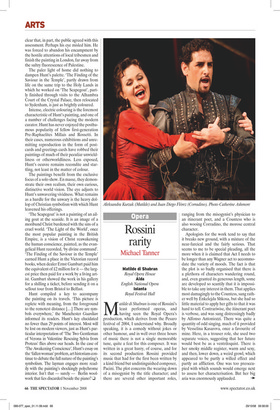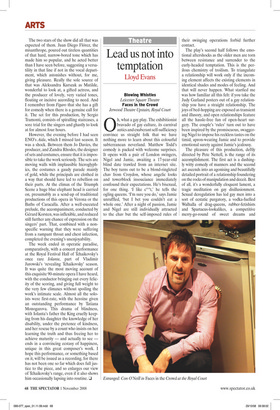Rossini rarity
Michael Tanner
Matilde di Shabran Royal Opera House Aida English National Opera Iolanta Royal Festival Hall
Matilde di Shabran is one of Rossini’s least performed operas, and having seen the Royal Opera’s production, which derives from the Pesaro festival of 2004, I understand why. Broadly speaking, it is a comedy without jokes or other humour, and in well over three hours of music there is not a single memorable tune, quite a feat for this composer. It was written in a great hurry, of course, and for its second production Rossini provided music that had for the first been written by a kind friend but undistinguished composer, Pacini. The plot concerns the wearing down of a misogynist by the title character; and there are several other important roles, ranging from the misogynist’s physician to an itinerant poet, and a Countess who is also wooing Corradino, the morose central character.
Apologists for the work tend to say that it breaks new ground, with a mixture of the near-farcical and the fairly serious. That seems to me to be special pleading, all the more when it is claimed that Act I needs to be longer than any Wagner act to accommodate the variety of moods. The fact is that the plot is so badly organised that there is a plethora of characters wandering round, and, even granted its generous length, some are developed so scantily that it is impossible to take any interest in them. That applies most damagingly to the Countess, sung rather well by Enkelejda Shkosa, but she had so little material to apply her gifts to that it was hard to tell. Contrariwise, the itinerant poet is verbose, and was sung distressingly badly by Alfonso Antoniozzi. There was quite a quantity of odd singing, much of it provided by Vesselina Kasarova, once a favourite of mine. Here, in a trouser role, she used two separate voices, suggesting that her future would best be as a ventriloquist. There is her smoky middle register, warm and sexy, and then, lower down, a weird growl, which appeared to be partly a willed effect and partly an affliction. One was too preoccupied with which sounds would emerge next to assess her characterisation. But her big aria was enormously applauded. The two stars of the show did all that was expected of them. Juan Diego Flórez, the misanthrope, poured out tireless quantities of that hard, narrow-bored tone which has made him so popular, and he acted better than I have seen before, suggesting a versatility in that line if not in the vocal department, which astonishes without, for me, giving pleasure. Really the sole source of that was Aleksandra Kurszak as Matilde, wonderful to look at, a gifted actress, and the producer of lovely, very varied tones, floating or incisive according to need. And I remember from Figaro that she has a gift for comedy when there is a genuine call for it. The set for this production, by Sergio Tramonti, consists of spiralling staircases, a sore trial for the singers and ghastly to look at for almost four hours.
However, the evening before I had seen ENO’s Aida, which I missed last season. It was a shock. Between them Jo Davies, the producer, and Zandra Rhodes, the designer of sets and costumes, ensure that it is impossible to take the work seriously. The sets are moving walls with implausible hieroglyphics, the costumes a gaudy parade mainly of gold, while the principals are clothed in a way that should have led to rebellion on their parts. At the climax of the Triumph Scene a huge blue elephant head is carried on, presumably as a send-up of traditional productions of this opera in Verona or the Baths of Caracalla. After a well-executed prelude, the accompaniment, conducted by Gérard Korsten, was inflexible, and reduced still further any chance of expression on the singers’ part. That, combined with a nonspecific warning that they were suffering from a rampant throat and chest infection, completed the evening’s unenjoyability.
The week ended in operatic paradise, comparatively, with a concert performance at the Royal Festival Hall of Tchaikovsky’s once rare Iolanta, part of Vladimir Jurowski’s ‘revealing Tchaikovsky’ season. It was quite the most moving account of this exquisite 90-minute opera I have heard, with the conductor bringing out every felicity of the scoring, and giving full weight to the very few climaxes without spoiling the work’s intimate scale. Almost all the soloists were first-rate, with the heroine given an outstanding performance by Tatiana Monogarova. This drama of blindness, with Iolanta’s father the King cruelly keeping from his daughter the knowledge of her disability, under the pretence of kindness, and her rescue by a count who insists on her learning the truth and thus freeing her to achieve maturity — and actually to see — ends in a convincing ecstasy of happiness, unique in this great composer’s work. I hope this performance, or something based on it, will be issued as a recording, for there has not been one so far which does full justice to the piece, and so enlarges our view of Tchaikovsky’s range, even if it also shows him occasionally lapsing into routine. ❑



































































































 Previous page
Previous page